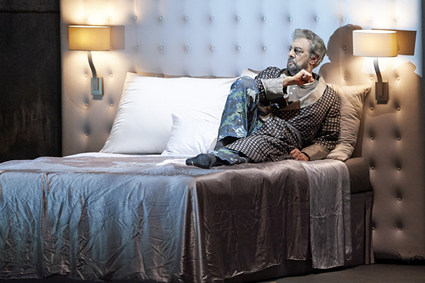| Opera Reviews | 25 April 2024 |
Domingo returns triumphantly to the Vienna State Opera as Macbethby Moore Parker |
|
| Verdi: Macbeth
Vienna State Opera 28 October 2019 |
|

Plácido Domingo (Macbeth)
|
|
|
Christian Räth’s production of Verdi’s Macbeth has seen several interesting revivals since its 2015 inception, but this series can arguably claim special ranking with the return to the house of Plácido Domingo for his first Vienna showing in the title role. While appearing a touch under-powered in comparison to Salzburg’s recent Luisa Miller, Domingo’s tone remains remarkably steady and reliable, and (while naturally lacking the bloom of earlier decades) still amazingly fresh and inimitable. This second performance in the run found Domingo at evident ease with the character and sharing fine dramatic tension with his Lady - most vividly so in Act 1’s "Sappia la sposa mia", and in the intimate interaction of Act 2’s opening and "La luce langue". If not ideal in timbre and register balance, Domingo’s reading is well-paced, credible, and indeed compelling - and he was rewarded warmly by a steadfast house grateful to have the opportunity of a “Wiedersehen” with a star still very much adored. His Lady, Tatiana Serjan, has made the role something of her own here, returning faithfully to the production since its original run, and her reading has naturally seen vocal and artistic variations over the course of time. On this evening a richer, warmer, and more commanding mid-range made undeniable impact, as did deft negotiation of passages requiring plasticity - even if some scale work remained sketchy and marred by awkward gear-changes in ascent to a disjointed upper range of “fluty” - rather than ideally engaged - head tones. Admirably, the remaining cast was drawn from the State Opera’s highly-competent ensemble, with Ryan Speedo Green (Banquo) boasting his eloquent and even-scaled bass, and Jinxu Xiahou (the premier cast Malcolm) now donning Macduff’s more demanding robe and making his mark in an impassioned "Ah, la pattern mano". Both these bass and tenor parts can be regarded as important - if compact - and well-chosen vehicles for these yet-maturing artists to test their mettle and establish further individuality and their artistic merit. The vital chorus contributions initially saw moments of hesitancy but rose to a superb "Patria opressa" in Act 4, which transpired to become one of the evening’s highlights. In the pit, Giampaolo Bisanti remained a touch guarded in dynamic options, and tended to favour rather pressing tempi throughout - which, while serving well to cushion occasional hazardous moments among the protagonists, ultimately rather deprived the Lady’s Sleepwalking Scene of atmosphere and impact. At the final curtain, bouquets flew from the stalls - not just for the living legend, but for the entire line-up.
|
|
| Text ©
Moore Parker Photo © Wiener Staatsoper / Michael Pöhn |
|







